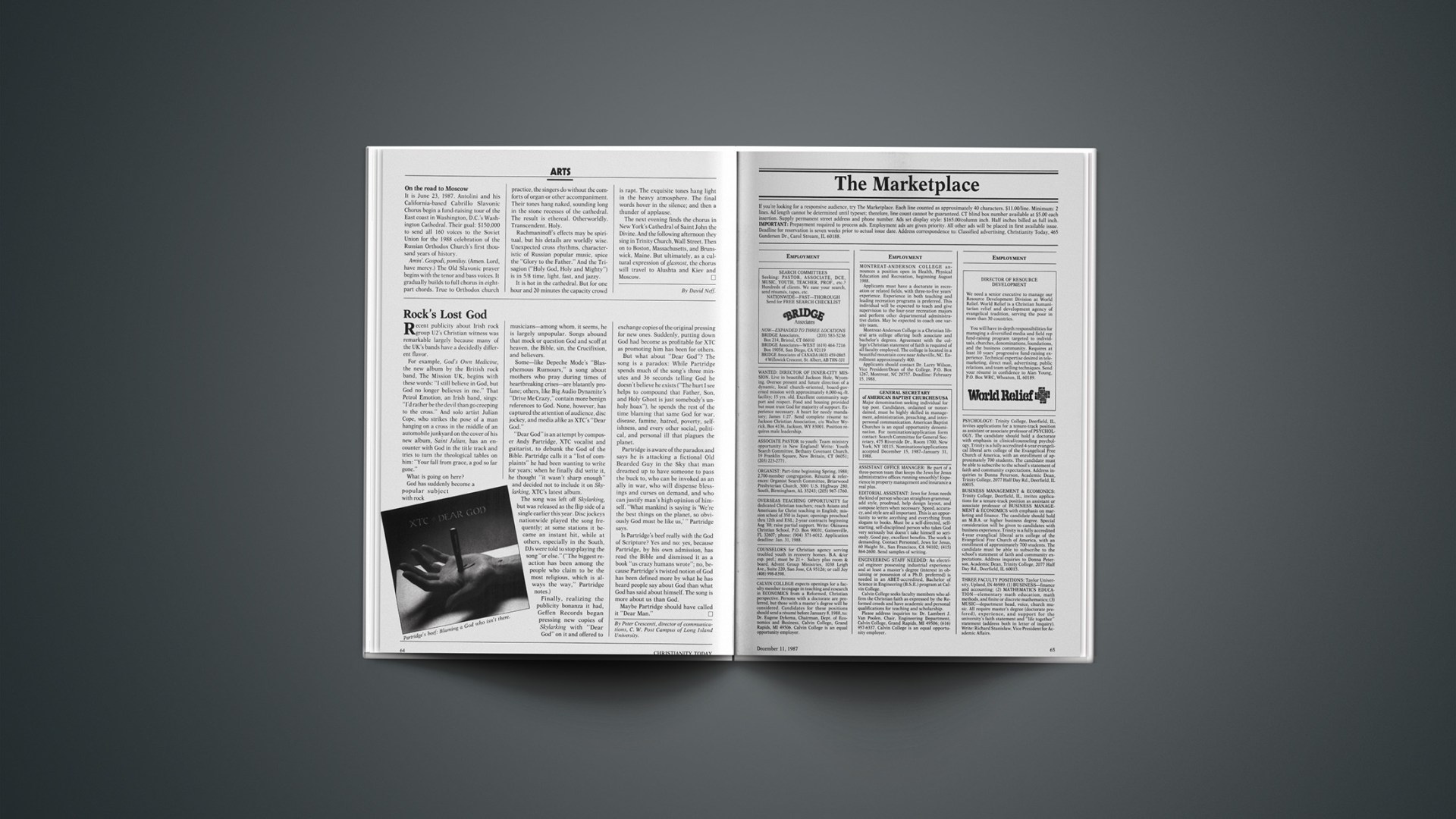Recent publicity about Irish rock group U2’s Christian witness was remarkable largely because many of the UK’s bands have a decidedly different flavor.
For example, God’s Own Medicine, the new album by the British rock band, The Mission UK, begins with these words: “I still believe in God, but God no longer believes in me.” That Petrol Emotion, an Irish band, sings: “I’d rather be the devil than go creeping to the cross.” And solo artist Julian Cope, who strikes the pose of a man hanging on a cross in the middle of an automobile junkyard on the cover of his new album, Saint Julian, has an encounter with God in the title track and tries to turn the theological tables on him: “Your fall from grace, a god so far gone.”
What is going on here?
God has suddenly become a popular subject with rock musicians—among whom, it seems, he is largely unpopular. Songs abound that mock or question God and scoff at heaven, the Bible, sin, the Crucifixion, and believers.
Some—like Depeche Mode’s “Blasphemous Rumours,” a song about mothers who pray during times of heartbreaking crises—are blatantly profane; others, like Big Audio Dynamite’s “Drive Me Crazy,” contain more benign references to God. None, however, has captured the attention of audience, disc jockey, and media alike as XTC’s “Dear God.”
“Dear God” is an attempt by composer Andy Partridge, XTC vocalist and guitarist, to debunk the God of the Bible. Partridge calls it a “list of complaints” he had been wanting to write for years; when he finally did write it, he thought “it wasn’t sharp enough” and decided not to include it on Skylarking, XTC’s latest album.
The song was left off Skylarking, but was released as the flip side of a single earlier this year. Disc jockeys nationwide played the song frequently; at some stations it became an instant hit, while at others, especially in the South, DJs were told to stop playing the song “or else.” (“The biggest reaction has been among the people who claim to be the most religious, which is always the way,” Partridge notes.)
Finally, realizing the publicity bonanza it had, Geffen Records began pressing new copies of Skylarking with “Dear God” on it and offered to exchange copies of the original pressing for new ones. Suddenly, putting down God had become as profitable for XTC as promoting him has been for others.
But what about “Dear God”? The song is a paradox: While Partridge spends much of the song’s three minutes and 36 seconds telling God he doesn’t believe he exists (“The hurt I see helps to compound that Father, Son, and Holy Ghost is just somebody’s unholy hoax”), he spends the rest of the time blaming that same God for war, disease, famine, hatred, poverty, selfishness, and every other social, political, and personal ill that plagues the planet.
Partridge is aware of the paradox and says he is attacking a fictional Old Bearded Guy in the Sky that man dreamed up to have someone to pass the buck to, who can be invoked as an ally in war, who will dispense blessings and curses on demand, and who can justify man’s high opinion of himself. “What mankind is saying is ‘We’re the best things on the planet, so obviously God must be like us,’ ” Partridge says.
Is Partridge’s beef really with the God of Scripture? Yes and no: yes, because Partridge, by his own admission, has read the Bible and dismissed it as a book “us crazy humans wrote”; no, because Partridge’s twisted notion of God has been defined more by what he has heard people say about God than what God has said about himself. The song is more about us than God.
Maybe Partridge should have called it “Dear Man.”
By Peter Crescenti, director of communications, C. W. Post Campus of Long Island University.










